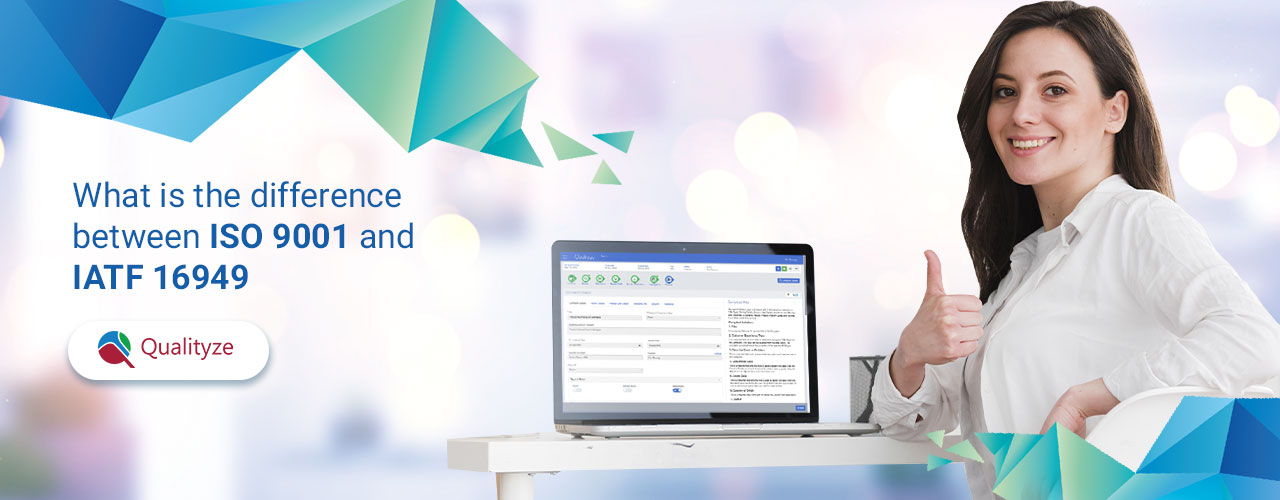

Calculate your potential savings with our ROI Calculator
ROI Calculator
Whether it’s about the things that we use or the food we consume every day, quality is the prominent consideration. Even the success of the organization depends on the quality of products/services they deliver to their customers.
Quality covers a broader spectrum, including safety, efficiency, and reliability, while many organizations define quality as exceeding customer expectations. This is the reason; there are some standard guidelines published for different industries to manage product quality and keeping the deviations to a minimum.
You already know that understanding different standard guidelines can be a confusing and costly chore. Fortunately, the core differences of ISO 9001 and IATF 16949 are highlighted in this post to give you the most accurate idea about both and their implementation. Let’s begin with a quick introduction of ISO 9001 and IATF 16949.
ISO 9001 is a set of international standards that defines requirements for an effective quality management system (QMS). ISO 9001 certified organizations are the ones that demonstrate their ability to deliver high-quality products and services consistently while meeting customer and applicable regulatory requirements.
IATF 16949, specified by The International Automotive Task Force (IATF), defines the QMS standards specifically for the Automotive industry. An organization needs to achieve this certification through a 3rd party auditor. Though IATF 16949 used the structure of ISO 9001, the automotive companies need to comply with both the manuals, i.e., IATF 16949 and ISO 9001, for achieving certification.
Though both the standards share the same structure, there are specific differences that you should know for the successful implementation of best practices in your organization.
Though guidelines specified in both the standards may vary, they share a common goal to achieve, i.e., Quality – for products, services, and processes. Achieving quality ensures Longevity, Fulfillment, Cost vs. Need, Security, Usability, and Efficiency of the product.
You must ensure quality is critical to keep your customers satisfied and retain their loyalty for long-term profits. Maintaining quality processes make the organization a better place to work while fostering a culture of continuous improvement.
Also, quality helps businesses to achieve:
When you have a well-documented and implemented Quality Management System in your organization, you can leverage multiple benefits like;
To achieve quality consistently, you need a quality management system that not only helps you to streamline and standardize the processes but also to measure and review the performance analytics for making necessary changes in the system.
Qualityze Enterprise Quality Management Software will make a perfect solution for all your quality management needs. It helps you gain a competitive edge by utilizing the best-in-class quality processes to ensure improved product quality and achieve compliance. It focuses on reducing the overall costs of quality, regardless of your industry focus.
Qualityze EQMS Suite includes Nonconformance Management, CAPA Management, Document Management, Change Management, Audit Management, Training Management, Complaints Management, Supplier Quality Management, Calibration Management, and Maintenance Management system.
Qualityze is built upon the world’s most secure and reliable platform, Salesforce.com, which enables your quality teams to manage end-to-end quality from anywhere around the globe. It also comprises features like Email Approvals, Important Reminders Notification, Digital Signature, Dashboards, and Reports.
Complying to quality standards, be it ISO 9001 or IATF 16949, gives your organization a competitive edge over others. You can put an effective quality management system in place to have better control of the process and maintain consistency in product quality.
Optimize Quality to Gain Customer Loyalty!
Author

Qualityze Editorial is the unified voice of Qualityze, sharing expert insights on quality excellence, regulatory compliance, and enterprise digitalization. Backed by deep industry expertise, our content empowers life sciences and regulated organizations to navigate complex regulations, optimize quality systems, and achieve operational excellence.